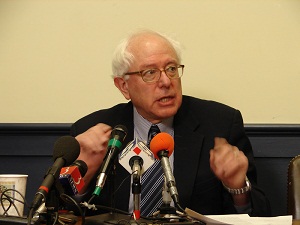Vermont energy leaders talk smart grid
 The future of clean energy solutions like solar power generation depends on the infrastructure we build today, U.S. Sen. Bernie Sanders (I-Vt.) said at the Vermont Smart grid conference this week.
The future of clean energy solutions like solar power generation depends on the infrastructure we build today, U.S. Sen. Bernie Sanders (I-Vt.) said at the Vermont Smart grid conference this week.
Energy experts from throughout New England and the nation gathered at the conference to discuss Vermont’s bold plan to implement a universal smart grid.
“As is widely known,” Sanders said in a speech at the conference, “one of the great energy challenges facing our nation today is modernizing an aging, inefficient and inadequate electric transmission system. This is a major issue not only because we want to make certain that we prevent future regional or national blackouts but, for those of us who want to move forward aggressively on sustainable energy, we need to be able to move and manage whole new sources of electric supply.”
The first step toward doing that is implementing a smart grid, he said. Vermont won $69 million in funding from the U.S. Department of Energy for its smart grid plan, which the state’s private and public utilities combined forces to match for a total of $138 million in funding.
Elizabeth Miller, commissioner of Vermont’s Department of Public Service, said the big challenge now will be gaining consumer acceptance for the new smart meters that the state’s utilities will be rolling out shortly.
“There are some lessons learned elsewhere” she said. “In California and Maine there has been some resistance. We want to avoid that resistance here.”
She said the key will be in offering utility customers options and choices and educating them on the virtues of the smart meter.
University of Vermont professor Paul Hines echoed those sentiments. He read headlines from Google news questioning the security and validity of smart meters.
“People are a little bit nervous about this,” he said.
The challenge will be to educate people about how the meters work and why they will help to save individual consumers on their electric bills and how they will contribute to even bigger cost and energy savings when applied in mass.
“This is a complicated process but is absolutely essential if we are to move away from fossil fuels and into such sustainable energies as wind and solar,” Sanders said.
“At a time when the United States imports some $350 billion a year in foreign oil,” Sanders added, “the Governor and the entire Vermont delegation understands that we can create, over a period of years, millions of good paying jobs in America as we move to energy efficiency and such sustainable energies as wind, solar, geo-thermal and bio-mass. And, in the process, we can cut greenhouse gas emissions and begin the process of reversing global warming.”
He said he was excited about Sandia’s partnership with Vermont and that he sees a significant clean energy future in the partnership forming there.
“In fact, we are already working together on several issues. UVM is now home to a Sandia solar photovoltaic site to test solar panel performance in cold weather climates,” Sanders said, “and Sandia has already been actively and very effectively working with Vermont utilities in addressing cyber-security issues.”
Sanders said he’s excited to see Vermont lead the nation as the first state to have an almost-universally deployed smart meter program by 2013.



